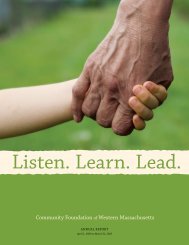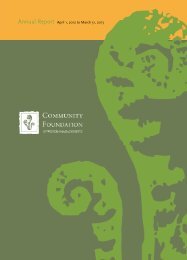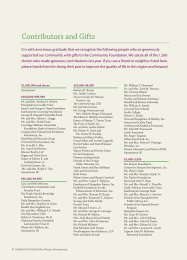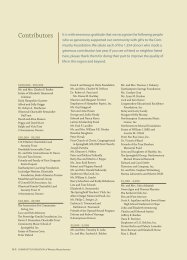Annual Report - Community Foundation of Western Massachusetts
Annual Report - Community Foundation of Western Massachusetts
Annual Report - Community Foundation of Western Massachusetts
Create successful ePaper yourself
Turn your PDF publications into a flip-book with our unique Google optimized e-Paper software.
S T A R T I N G A F U N D<br />
A Glance at Planned Gifts<br />
Bequest<br />
A simple planned gift can be made naming a fund<br />
at the <strong>Community</strong> <strong>Foundation</strong> <strong>of</strong> <strong>Western</strong> <strong>Massachusetts</strong><br />
as a beneficiary <strong>of</strong> your estate. The terms<br />
<strong>of</strong> that fund can be arranged directly with the<br />
<strong>Community</strong> <strong>Foundation</strong> at that time, and can be<br />
changed later simply by contacting the <strong>Foundation</strong>.<br />
IRA, 401 (k), 403 (b) or Other Qualified<br />
Retirement Plan Assets<br />
A donor may use these assets to leave a legacy<br />
simply by naming the <strong>Community</strong> <strong>Foundation</strong><br />
as the beneficiary. Such assets are <strong>of</strong>ten subject<br />
to both estate and income taxes, so these assets<br />
should be the first used for charitable bequests.<br />
Life Insurance<br />
The <strong>Community</strong> <strong>Foundation</strong> <strong>of</strong> <strong>Western</strong><br />
<strong>Massachusetts</strong> can be named as the owner and<br />
beneficiary <strong>of</strong> a new or existing policy—perhaps<br />
a policy that is no longer essential to your financial<br />
goals. Subsequent premiums that you pay will<br />
then become tax deductible.<br />
Charitable Gift Annuity<br />
A gift annuity is a contract with the <strong>Community</strong><br />
<strong>Foundation</strong> to pay a fixed income, usually for the<br />
life <strong>of</strong> the donor and/or spouse, but others can be<br />
named as the life beneficiaries. At the conclusion <strong>of</strong><br />
the annuity, the <strong>Foundation</strong> will add to an existing<br />
or a new permanently endowed fund an amount<br />
equal to the difference between the original gift<br />
and the cost <strong>of</strong> providing the annuity.<br />
Charitable Remainder Trust<br />
A Charitable Remainder Trust is a trust that allows<br />
a donor to receive income (or provide income for<br />
another person) with the knowledge that the funds<br />
remaining when the trust terminates will be used<br />
to support the donor’s charitable interests.<br />
Charitable Lead Trust<br />
A Charitable Lead Trust is a trust that enables<br />
the donor to make significant charitable gifts<br />
in the near term, and then distribute the remainder<br />
interest to non-charitable beneficiaries, who<br />
may benefit from significantly lowered gift and<br />
estate taxes.<br />
will be made after the end <strong>of</strong> the annuity period. A<br />
tax deduction for part <strong>of</strong> the gift is based on the age<br />
<strong>of</strong> the life beneficiary (ies).<br />
By using appreciated securities for the charitable<br />
gift annuity, donors can generate income and defer<br />
the long-term capital gains tax normally associated<br />
with the disposition <strong>of</strong> these securities.<br />
Charitable Remainder Trusts<br />
A charitable remainder trust is an irrevocable trust<br />
that pays income to non-charitable beneficiaries<br />
(donor, spouse, parents, etc.) for a specific period <strong>of</strong><br />
time, and the remainder to a charity. It is normally<br />
not economical to establish and administer a charitable<br />
trust with less than $50,000.<br />
The trust is a separate entity created by an irrevocable,<br />
written instrument prepared by an attorney<br />
and requiring a trustee. The <strong>Community</strong> <strong>Foundation</strong><br />
will serve as the Trustee if the remainder <strong>of</strong> the<br />
trust goes to an endowed (permanent) fund at the<br />
<strong>Foundation</strong>. The fund at the <strong>Community</strong> <strong>Foundation</strong><br />
that receives the remainder <strong>of</strong> the trust can be<br />
tailored to the charitable interests <strong>of</strong> the donor.<br />
The amount payable to the income beneficiary(ies)<br />
can be a fixed dollar amount (Annuity Trust), or a<br />
fixed percentage <strong>of</strong> the principal <strong>of</strong> the trust each<br />
year, which will vary with the investment returns <strong>of</strong><br />
the trust (Unitrust). When a charitable remainder<br />
trust is established, the donor can usually take a tax<br />
deduction for part <strong>of</strong> the gift, based upon the age<br />
<strong>of</strong> the life beneficiary(ies) and the payout rate. The<br />
older the income beneficiary(ies), and the smaller<br />
the payout rate, the larger the deduction.<br />
By giving appreciated securities to the trust, the<br />
long-term capital gains tax normally associated with<br />
the disposition <strong>of</strong> those securities can be deferred.<br />
Bequests<br />
A donor can create an endowed fund during his or<br />
her lifetime that will be fully funded at the time<br />
<strong>of</strong> death via a simple bequest. By establishing an<br />
endowed fund during his or her lifetime, the donor<br />
is able to choose how the fund is distributed in perpetuity.<br />
This method <strong>of</strong> creating a fund is appealing<br />
to donors who want to make a lasting impact on the<br />
community, but for whom making a significant gift<br />
during his or her lifetime is not an option.<br />
<strong>Community</strong> <strong>Foundation</strong> <strong>of</strong> <strong>Western</strong> <strong>Massachusetts</strong> 57








